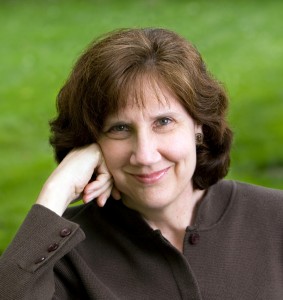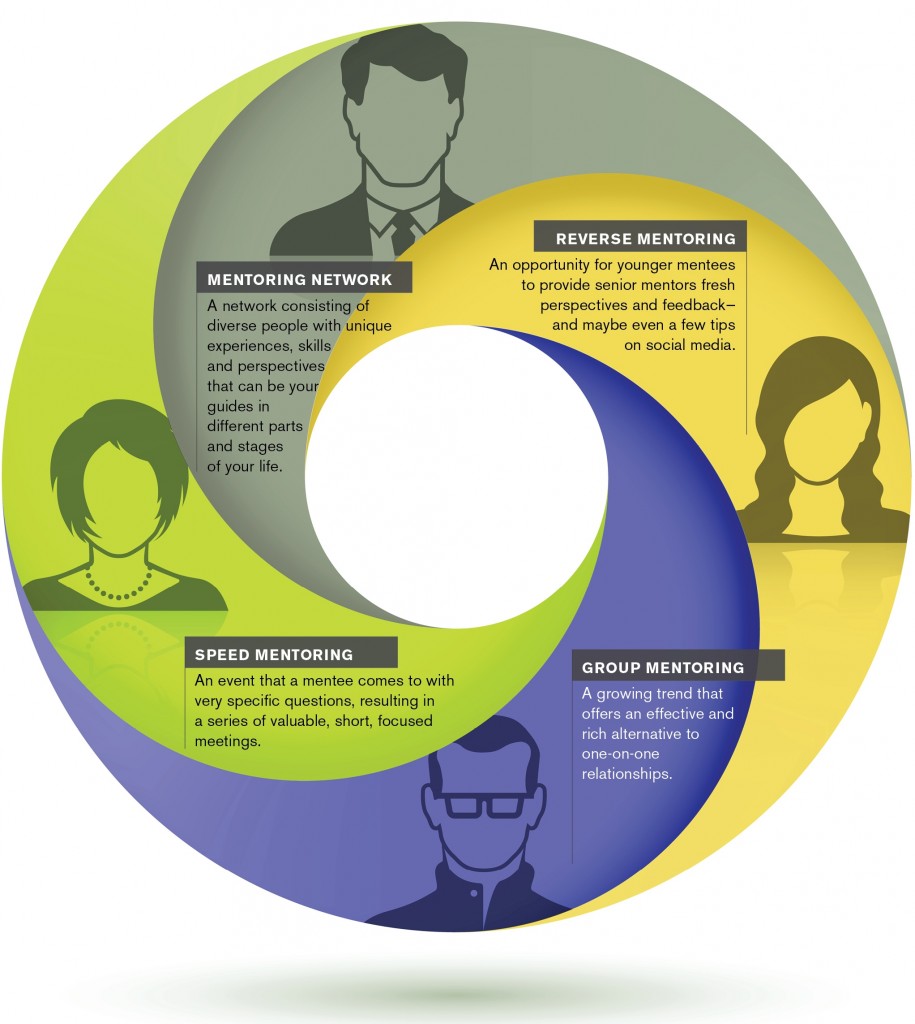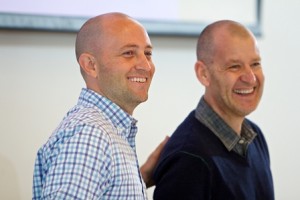Modern mentoring
Foster’s mentoring maven, Susan Canfield, discusses how the time-honored practice has evolved, and how you can get involved
Mentoring is having its moment.
An ancient concept, the powerful exchange between expert and apprentice is experiencing a surge in the public consciousness. Mentoring is a buzzword in business. Columnists hold forth on its virtues. And formal programs proliferate at b-schools.
 The Foster School’s MBA Mentor Program was one of the first, and it’s still one of the best. The long-time director of this national model of mentoring, Susan Canfield, has become a nationally recognized authority on the subject. We asked the author of Mentoring Moments: Inspiring Stories from Eight Business Leaders and MBAs to enlighten us on mentoring beyond business school.
The Foster School’s MBA Mentor Program was one of the first, and it’s still one of the best. The long-time director of this national model of mentoring, Susan Canfield, has become a nationally recognized authority on the subject. We asked the author of Mentoring Moments: Inspiring Stories from Eight Business Leaders and MBAs to enlighten us on mentoring beyond business school.
What’s new to learn about the ancient art of mentoring?
Susan Canfield: Plenty! Mentoring has evolved in recent years. Traditionally, people viewed themselves as either a mentor or a mentee. Today we recognize that we can be both at the same time and throughout our lives. It was once assumed that a mentor must be more senior and experienced than the mentee. In fact a mentor can be anyone from whom you can learn. In the past it was common for the mentor to choose the mentee and structure and drive the relationship. Now we know it is better if the mentee chooses the mentor and drives the relationship. Finally, mentoring used to be seen more as a formal, ongoing relationship. Today we know it need only last as long as it is useful and may be based solely on observation.
I titled my book Mentoring Moments because, after many years observing mentoring relationships and conducting interviews on the subject, I learned that mentoring moments can come from formal programs and one-time meetings. They can come from family, friends, colleagues and even people we hardly know. They can come from hearing wise words and seeing wisdom in action. In fact they often come when we least expect them and most often need them.
What do you think accounts for the growing interest in mentoring?
A number of factors. People are seeking ways to accelerate their learning as they navigate more frequent career changes and face life’s challenges. Baby Boomers are arriving at a time in their lives when they want to give back. Universities are finding mentor programs attract prospective students, enrich their students’ academic experience, and provide them with career insights and connections. And businesses are seeing evidence that mentoring brings bottom-line benefits and addresses the issue of knowledge transfer before those Boomers walk out the door.
What are the hottest mentoring trends?
There are several. In reverse mentoring, younger recruits provide senior staff fresh perspectives and feedback—and maybe even a few tips on social media. Group mentoring, a trend we’ve pioneered at Foster, is an efficient alternative to one-on-one one relationships. And our experiments with speed mentoring have received unexpectedly rave reviews from both participating students and mentors. When a mentee prepares ahead and comes with specific questions, you’d be surprised at how valuable a short, focused meeting can be.
 Who should seek a mentor? Only the young and inexperienced?
Who should seek a mentor? Only the young and inexperienced?
We can all benefit from a mentor—or many mentors—throughout life. It’s a relationship that enhances our learning and growth, no matter what age. And, if we’re lucky, mentors inspire us as well.
My vibrant, still-learning 94-year-old mother has a number of informal mentors. One is Grace, a 99-year-old friend who travels, has an active social life and gets up early to swim every morning. Grace is an informal mentor and inspiration to my mother in how to continue aging with grit and gusto.
Stewart Parker (MBA 1981), a Foster MBA Mentor who founded Targeted Genetics, says that you can get along without mentors, but it may be harder to fully realize your opportunities and potential. Mentors make it easier to have perspective and a healthy approach to life.
How do you find a mentor?
We can seek mentors in formal programs (at work, school or community organizations) or create them informally on our own.
Formal mentoring programs in companies, for example, can run the gamut from being available to all employees to only being offered to select, high-potential managers. Increasingly mentor programs have become more widely available because of growing evidence that they help attract and retain talent, contribute to employee engagement, enhance training opportunities, and support leadership and diversity initiatives.
Informal mentoring opportunities are all around us and are often there just for the asking. If you are open, curious, and eager to learn, then it is natural to seek conversations with people you want to learn from. Avoid starting with “will you be my mentor?” Instead, ask for advice or feedback about a specific question or problem. One conversation over a cup of coffee may be sufficient. However, if you would like to meet again, you may eventually use the word “mentor.” Or maybe not.
At Foster, we encourage our MBAs to take advantage of our formal MBA Mentor Program and seek informal mentoring opportunities as well. Better yet, I recommend creating a mentoring network consisting of diverse people with unique experiences, skills and perspectives that can be your guides in different parts and stages of your life. This dynamic approach might include a combination of ongoing mentors and others who move in and out of your life as your interests and needs change.
How does a dynamic approach work?
A great example is Chris Howard (MBA 2007), founder of Fuel Capital, a San Francisco venture firm. As an incoming MBA student, Chris immediately impressed me with his networking savvy. He knew the power of creating a mentoring network—including faculty, staff, peers, alumni and members of the business community—that he called his “board of advisors.” He was very intentional about what he wanted to learn and finding people he wanted to learn from.
Along with this fluid board of advisors, Chris took full advantage of our formal mentor program and chose Richard Tait, co-founder of Cranium and founder of Golazo, as his mentor. Both Chris and Richard were seeking a goes-both-ways mentoring relationship, and they clicked immediately. Eight years later, they’re still learning from each other and regularly return to Foster to speak on their powerful mentoring relationship.
Chris would be the first to admit that all of these relationships helped him turn a pre-MBA career in advertising into a successful second act in venture capital.
What do exceptional mentees contribute to a great relationship?
Great mentees take initiative and maintain contact with their mentor. They know what they want to learn and they actively drive the relationship. They prepare for meetings. They are honest about challenges at work and in life, and are open to feedback. They respect their mentor’s time. They express appreciation and lend mentors a hand when they can. They create a network of mentoring relationships. They pay it forward and seek opportunities to mentor as well.
In short, great mentees are hungry to learn and appreciative of all the wisdom they can observe, hear and absorb.
Who should be a mentor? And why?
Anyone who wants to facilitate the professional and personal development of another should consider mentoring, not only for the sake of the mentee but also for their own growth and opportunity.
Studies from the pioneering corporate mentoring program at Sun Microsystems found that mentors are 20 percent more likely to receive a raise, and six times more likely to be promoted. And, according to several longitudinal studies cited in George E. Vaillant’s Aging Well, those who mentor—seeking to better the world not only for themselves but for others—effectively triple their chances of being joyful in their 70s.
Outside of formal programs, how do you go about offering mentorship?
The short answer is: be someone people want to learn from.
In fact, you may already be mentoring and not even know it. Many of the senior executives I interviewed for my book mentioned learning great lessons from their bosses and leaders by simply observing their actions and behavior. In addition, these executives were encouraged to stretch and grow professionally by someone who believed in them. In many of these situations, the word “mentor” was never used.
How can you become an exceptional mentor?
Exceptional mentors see the relationship as a two-way street. They create an atmosphere of trust. They genuinely enjoy mentoring. They listen deeply and ask insightful questions. They give honest feedback. They are vulnerable and willing to share their own setbacks and how they overcame them. They see abilities in mentees they may not see in themselves. They discuss and help mentees set goals. They facilitate connections. They provide role modeling for work and life. They inspire mentees to be their best selves.
We may not all be born with the mentor gene but we can certainly strengthen our mentoring muscles with guidance, good role models, practice, and a genuine desire to get better. I have seen this among our MBA mentors, many of whom have been guiding and inspiring our students for a decade or more.
Read more about the Foster’s MBA Mentor Program, an internationally-renowned model of modern mentoring.
Learn more about mentoring at Foster or how to purchase Canfield’s book.

